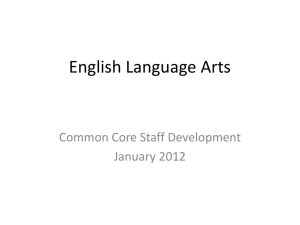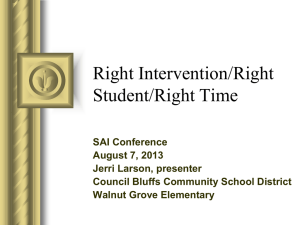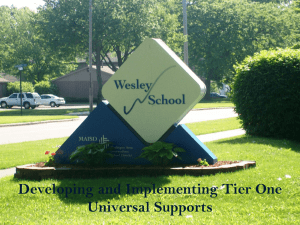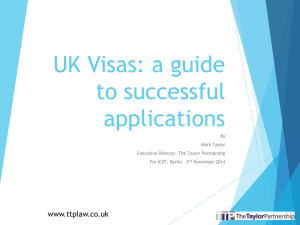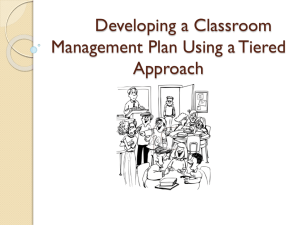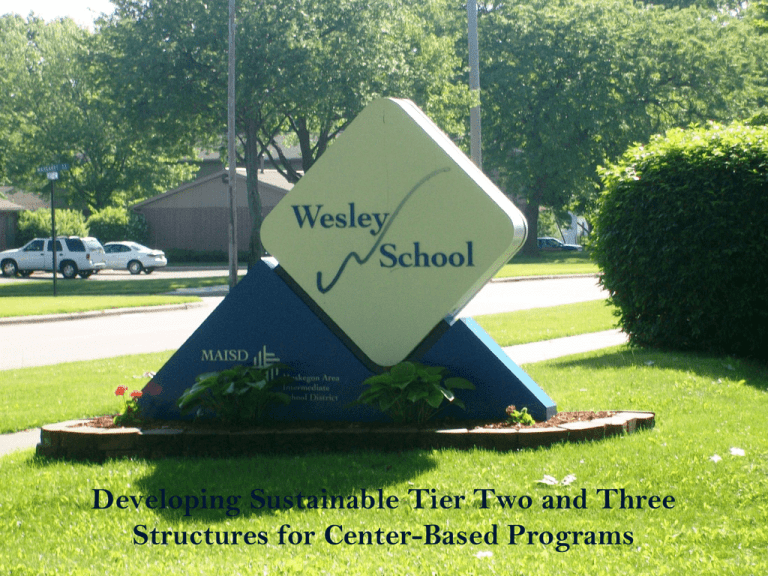
Developing Sustainable Tier Two and Three
Structures for Center-Based Programs
Presenters
• Michael Bausano
– Chair – Behavioral Steering Committee
• Stephanie Lathrop
– Chair – PBIS Committee
– Chair – Tier Three Committee
• Casey Stegall
– Chair – Tier Two Committee
Today’s Agenda
• Welcome and
Introduction
• Our PBIS Journey
• Current TIER 2
Interventions
• Current TIER 3
Interventions
• Work in Progress
• PBIS Committee
Survey
• Ideas For New Teams
• Wrap-Up
Behavior Steering
Committee
PBIS
Peer Review Committee
Professional Development
Safety Committee
SWIS Data
TCI/Devereux Training
TIER Classroom
Wesley School Behavioral Guidelines
Functional Skills
Committee
Assistive/Alternative Com.
Assistive Technology
PODDS/PECS
Feeding
Toileting
Oral Motor Skills
SPOT
Academics
Committee
Curriculum Committee
Sex Education
Literacy Pilot
Unique Learning System
Special Events
School
Improvement
Team
Administration
New Staff Orientation, Referral Team,
Technology, Facilities, Professional Development
Wesley School
• Center-based special education program
• Operated by the Muskegon Area ISD
• Provide educational opportunities for 200
students, ages 3 – 26, with severe developmental
disabilities
• Serve 12 local school districts of Muskegon
County.
Our PBIS Journey
•
•
•
•
•
•
•
Currently 4th year of Implementation
Pre 2009
– Expert “Behavioral Consultation” Model
– Therapeutic Crisis Intervention
– Wesley School Behavioral Guidelines
2009 - 2010
– Develop and Implement Tier One
– Refine Pre-Existent Tier Three Structures
– Devereux Safe and Positive Approaches
2010 – 2011
– Refine Tier One – Emphasis: Universal Supports
2011 – 2012
– Develop Tier Two
2012 – 2013
Implement Tier Two and Expand Tier Three
Noteworthy Resources and
Initiatives
Wesley PBIS Structure
•
•
Tier 2:
– CICO
– PBSP
– Social Skills Group
– SWIS Data
Tier 3:
– Enhanced Student and
Staff Support
– PRC
– SWIS Data
– TCI/Devereux Training
– TIER
Current Tier Two Interventions
• Check In – Check Out (CICO)
• Positive Behavior Support Plans
• Social Skills Group
Current Tier Two Interventions
Check In – Check Out
• CICO Process
– Referral
– Initial Meeting
– Develop Goals,
Rewards and Data
Collection Methods
– Define Roles
– Establish schedule
– Follow-Up Meeting
Current Tier Two Interventions
Check In – Check Out
•
•
Current CICO Cases
– Three Active
– One Completed
– One New Referral
Our Success!!
– Problem Behavior: “School
Attendance”
– Attendance improved
from 2-3 half days a week
to full-time over the
course of two months!
Current Tier Two Interventions
Positive Behavioral Support Plans
•
•
•
•
Data-driven Decision Making
Functional Behavioral Assessment
SWIS/Other Instruments
Collaboratively Development (Meeting Mechanics)
– Classroom Staff
– Parents
– Support Staff
• Modeling and staff training to ensure fidelity
• Reviewed at least annually
Current Tier Two Interventions
Social Skills Group
•
Monday and Wednesday
Afternoons
• 10 Week Course
• Focus: Transition
Students
– Topics
• Bullying
• Boundaries and
Relationships
• Grief and Loss
• Mindfulness
– Focused Breathing
– Meditation
• Substance abuse
• Field Trips
– Restaurants
– Career Tech Center
Current Tier Three Interventions
•
•
•
•
•
Enhanced Staff and Student Support
Peer Review Committee
SWIS Data (Student Specific)
TCI/Devereux Training
Therapeutic Intervention and Educational
Room (TIER)
Current Tier Three Interventions
Enhanced Staff Support
• Individual and
Team Support
– Mindfulness
Training
•
•
•
•
Being vs. Doing
Body Scans
Life Stories
Meditative
Breathing Exercises
– Team Building
Current Tier Three Interventions
Enhanced Student Support
– Specialized
– Individualized
• Emergency Intervention Plans
– Emergency Physical Restraint
– Emergency Seclusion
– Two Key Systems Involved
• Peer Review Committee
• SWIS Data
Current Tier Three Interventions
Peer Review Committee
• Evaluate the quality and
effectiveness of student
PBSPs and EIPs.
• Collaborative resource for
staff.
• PRC reviews all:
– Emergency Intervention
Plans (EIPs).
– Situations involving
emergency interventions
(restraint/seclusion) when
no EIP exists.
– Progress of students in
TIER.
– Requests for student
placement in behavioral
classroom.
Current Tier Three Interventions
School-Wide Information System
(SWIS)
• Primary behavioral data
tool.
• Wide application
• Focused Use
– Disruptive Behaviors
– Track
• Emergency
Interventions
• Crisis Team
Responses
Current Tier Three Interventions
Comprehensive Training
Therapeutic Crisis Intervention (TCI)
• TCI introduced to Wesley
in 2007
• Premier crisis intervention
and prevention training
system
• 3-4 day training options.
• All staff initiative
• Training extended to local
districts in 2009
• Annual refresher training
• Bi-monthly all staff
physical restraint practice
APPROVED TCI SAFETY
INTERVENTIONS
Current Tier Three Interventions
Comprehensive Training
Devereux Safe and Positive Approaches
• Devereux introduced
in 2009.
• Similar to TCI
• Additional benefits of
“moving restraints”
– Escorts
– Assists
– Carries
Devereux Safe & Positive Approaches
Current Tier Three Interventions
Therapeutic Intervention and Educational
Room (TIER)
– History of Room 20
– Evidence Based and Data
Driven
– Five Tier Three
Classrooms
– Referral
– Team Collaboration
• Weekly Team
Meetings
• Data Collection
• Time of Day
• 15 Minute
Interventions
• Goals/Objectives
PBIS - A Work in Progress…
• Emphasize Our
Wesley “Star Man” as
a positive role model
• Webcam for Weekly
STAR drawings
• Meet the needs of our
SXI population more
effectively
• Refine incentives for
both staff and
students
PBIS Committee Survey
• Initial
Considerations
–
–
–
–
–
PBIS Vision
Committee Size
Roles
Time Management
Staff buy-in
• Creating Staff
Support
– Administrative
Leadership
– Core Group/Tier
Chairs
– Share Data
– Celebrate
Successes
– Make it fun
Ideas For New Teams
• View PBIS as a work-in-progress.
• Recognize administrative support and
presence is essential.
• Adapt PBIS to fit your existing school
culture and structure.
• Braid PBIS with other key initiatives.
• Stay the course and expect
obstacles…adapt, improvise and overcome.
• Celebrate often and have fun!
Thank You!
• Questions
• Ideas
• Feedback

